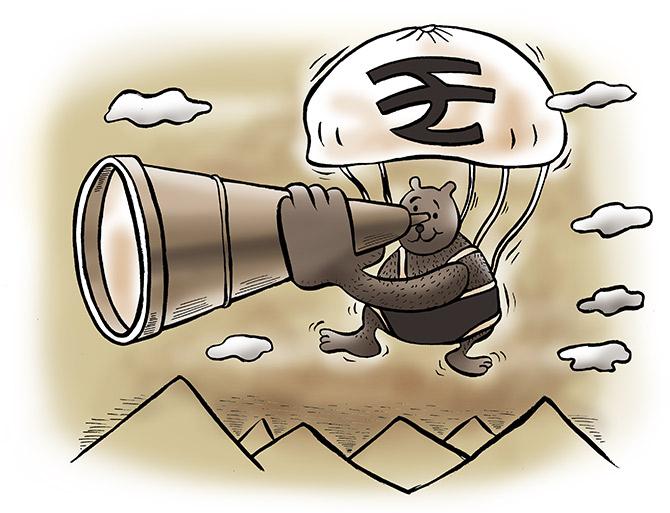 | « Back to article | Print this article |
The income tax department estimates total collection to be between Rs 10.5 trillion and Rs 10.7 trillion against the revised target of Rs 11.7 trillion.

India’s direct tax collection for the current fiscal year ending March 31 is likely to see a whopping shortfall of about Rs 1.5 trillion compared to the revised estimates (RE).
This is set to take place for the first time in at least two decades, derailing the government’s fiscal deficit goals.
According to senior officials, the income tax department estimates total collection to be between Rs 10.5 trillion and Rs 10.7 trillion against the revised target of Rs 11.7 trillion.
However, the exact figures may come by April 1.
Tax officials attributed the acute shortfall to the global pandemic.
But even the earlier months of the year had turned out to be bad for direct tax collection.
Sources in the department said that the Vivad se Vishwas scheme, which is expected to give a leg up to collections, has not seen a single big entry so far.
Since the scheme has been pushed to June, people are likely to come forward only after the lockdown is lifted.
The government had set direct tax collection target of Rs 13.5 trillion for the current financial year (2019-20) in the budget estimates (BE), an increase of 17 per cent over the previous year.
However, during the year, businesses and corporates witnessed significant decline in demand.
This led to job losses and cut in the investment targets.
Further, change in corporate tax structure coupled with the Covid-19 outbreak has worsened the situation.
The government had to revise the BE downwards to Rs 11.7 trillion in RE on account of reduction in the corporation tax rates.
This is expected to hit the exchequer by Rs 1.45 trillion and slow down the economy.
According to official figures, the tax office managed to garner Rs 9.57 trillion till March 18, a decline of 5.3 per cent over the corresponding period in the previous year.
Sources said the tax department had started making efforts after seeing a drop in the third quarter (October-December) advance tax collection payment.
In the third quarter, corporation tax mop-up dropped by 5 per cent.
In January, the total collection stood at Rs 7.3 trillion.
In the fourth quarter ( January-March), advance tax payment by corporates further slipped to 10 per cent.
The shortfall may widen the Centre’s fiscal deficit, which is pegged at 3.8 per cent of GDP in the current financial year, said a government source.
Fiscal deficit surpassed the budget target for FY20 by 28.5 per cent in absolute terms by January itself.
However, the focus of the government is now not on the economic situation but to arrest the Covid-19 outbreak, which has halted every activity and eroded billions.
Tax experts, too, feel that the priority is not fiscal math but to contain spread of the global outbreak.
“At this point, the immediate focus is to arrest the pandemic and not the fiscal deficit.
"Rather, the Centre and states should lend maximum to support venerable businesses, especially small and medium enterprise and in making them solvent,” said Sudhir Kapadia, national tax leader, EY India.
“Further, government should also focus on relevant sectors such as hotels, tourism entertainment and aviation, which are completely shut during the lockdown.
"All in all, there is no way any country, including India, can hope for taxes and improving fiscal math.
"Even if the fiscal deficit widened 1-2 per cent, the focus should be on the survival of business,” Kapadia said.
Sanjay Sanghvi, partner, Khaitan & Co, said, “This unfortunate development of Covid-19 and the complete lockdown have derailed the government’s tax collections target.
"This fiscal year will be an exceptional and historical year for the government in terms of low tax collection and growth.
"However, I think the first priority for the Centre in this trying moment is to contain the spread of this pandemic.”